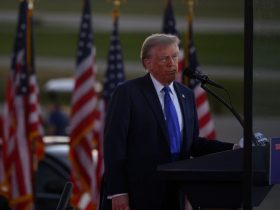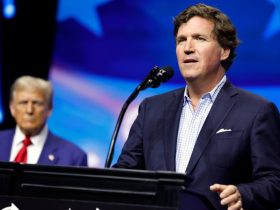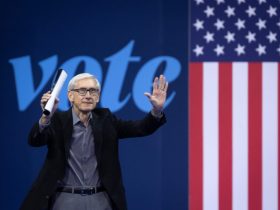As Donald Trump consolidated power over the Republican Party in 2015 and 2016, his opponents, then still confident that he would not be president, mused at how much more dangerous a candidate who espoused Trump’s politics but not his tactics might be. A candidate that dishonestly disparaged immigrants and attacked the foundations of American democracy — but also refrained from making wild, silly claims and tweeting out attacks at random critics?
Even Trump supporters often (however sincerely) express their desire for such a candidate. I don’t like some of the things he says, many will say of Trump, but I agree with his policies. An ideal candidate, then, would be one who could offer Trumpism without Trump.
Ladies and gentlemen, please welcome JD Vance to the stage.
The senator from Ohio and Republican vice-presidential nominee presented himself as this upgraded iteration of Trump during Tuesday night’s debate. All of Trump’s policies were there, as were various falsehoods about what Trump had done or promised to do as president. But it was packaged as a Yale Law School graduate, someone who exuded the mannerisms and satisfaction of an experienced academic debater. Resolved: Donald Trump should be president and I should be vice president, and I’m going to say what it takes to prevail in this engagement.
At one point, Vance was asked about Trump’s pledge to carry out a mass deportation of immigrants living in the United States.
“Could you be more specific about exactly how this will work?” a moderator, CBS News’s Margaret Brennan, asked. “For example, would you deport parents who have entered the U.S. illegally and separate them from any of their children who were born on U.S. soil?”
It is hard to know how Trump would have answered such a question, admittedly, since it could have gone in any direction imaginable. Policy questions and pointed queries from non-sycophantic interviewers are not his strength. By contrast, you could sense Vance’s comfort in the environment and he dodged the question as if he were remaking “The Matrix.”
He pivoted to criticize the policies of the Biden administration (blamed on Vice President Kamala Harris, naturally) and peppered the answer with false claims about the problem. (There are not “20 [or] 25 million” undocumented immigrants in the country, nor did the government “lose” 320,000 children.) He assured the moderator that he would answer her question but instead simply pledged to prioritize the deportation of immigrants in the country who have criminal records.
Brennan didn’t let it slide, again pressing him on the specific question about stripping parents from their children. He deftly sidestepped the question again, attacking the administration.
It’s easy to lose sight of the extent to which the question itself and the proposal it reflects is an extreme outlier in American political history. Vance’s presentation of himself as a normal, sober politician — something that was very obviously one of his goals coming into the evening — was aided by Trump’s having already injected these ideas into the national conversation. A sign of the extent to which a policy of mass deportation has simply become another policy plank was when CBS’s on-screen graphic summarized the candidates’ housing policy proposals and included “mass deportation to ease demand” among the items on a list topped with smiling photos of Trump and Vance. And there was Vance, smiling in the debate, assuring people that all of it would be fine, this deportation of millions of people, and it went down easier given the lack of sidebars about the dining habits of Hannibal Lecter.
This was the pattern over and over. Vance was asked to explain things that he or his running mate had done or promised, and he parlayed the questions into the things he wanted to talk about instead. A question about health care evolved into a ridiculous claim that Trump had saved the Affordable Care Act as president, legislation that Trump tried repeatedly to dismantle. A question about abortion gave Vance a chance to offer empathy, telling a truncated story about a friend who’d had an abortion — and then saying that the lesson was that Republicans have “got to do so much better of a job at earning the American peoples’ trust back on this issue.”
He and his Democratic opponent, Minnesota Gov. Tim Walz, engaged in a characteristically Midwestern engagement with plenty of generosity and comity on display. For Vance, this was an existential need, given his public perception. It was also an effective mask for just how extreme the issues under consideration were: mass deportations, sweeping restrictions on abortion access, Vance’s disparagements of his own constituents. The debate felt like a return to normal after nine years of Trump, which is the best thing that could happen to a Trump agenda that deviates so widely from normalcy.
Where Vance fumbled the most obviously was when he was presented with a position he couldn’t dodge. He is Trump’s running mate in part because he’s been willing to parrot and champion Trump’s claims about the validity of the 2020 election and how it should have been addressed. He tried to pivot this against his opponents as well, suggesting that it was “really rich for Democratic leaders to say that Donald Trump is a unique threat to democracy” given that the former president “peacefully gave over power on January the 20th as we have done for 250 years in this country.” As a parent of young kids, Vance should understand that finally doing what’s required does not excuse the kicking, screaming temper tantrum.
When Walz demanded that Vance admit that Trump had lost the 2020 election, Vance didn’t have a good answer ready, if there was one to be had. He tried to pivot into a flimsy attack on Harris (centered on efforts to stamp out misinformation during the covid pandemic) without addressing Walz’s point. And that, of course, was the answer, the answer that Walz and anyone else would have expected.
That’s the problem with being Trump 2.0 in the moment: Vance is still tied to Trump’s idiosyncrasies. There are other problems, too, to be sure, including that Vance lacks Trump’s flair and ability to compel the Republican base. But nearly a decade into Trump’s dominance of the GOP, we got a glimpse on Tuesday night of how Trumpism will evolve: more polish and more traditional political mannerisms doing a better job of masking the extremism and dishonesty that define Trump’s politics.










